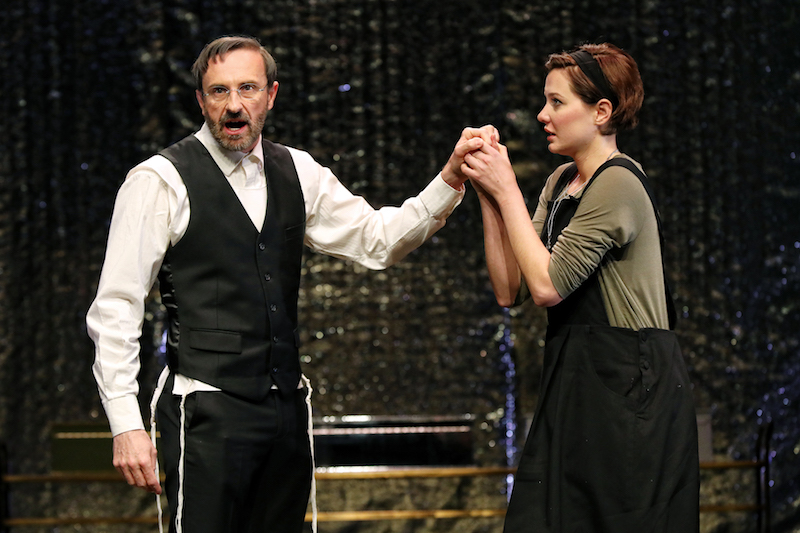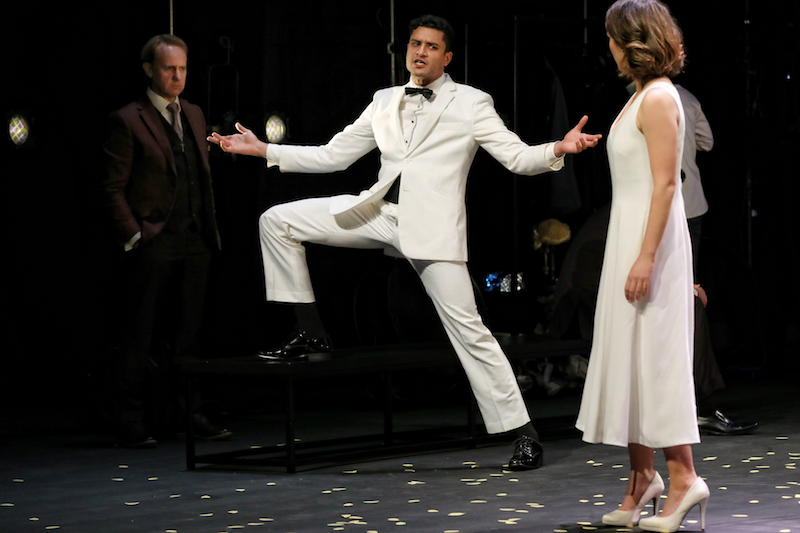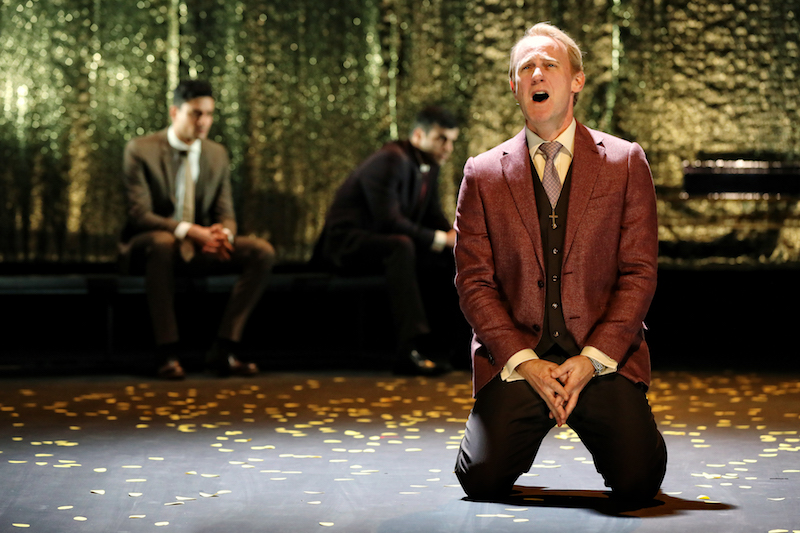The Merchant of Venice is classified as one of Shakespeare’s comedies but with its unpleasant strain of anti-Semitism it is considered one of his problem plays and one of the trickier to direct. How to pitch the portrayal of Shylock, the Jewish merchant who demands his pound of flesh yet speaks eloquently about discrimination and how he has been pushed to seek revenge in his famous “Hath not a Jew eyes speech”? How to handle the ugly behaviour of the Christians in the courtroom scene when Shylock is outsmarted? How to balance the cruelty in the play with its lighter side and happy ending (for all but Shylock)?
 Mitchell Butel and Felicity McKay. Photograph © Prudence Upton
Mitchell Butel and Felicity McKay. Photograph © Prudence Upton
In this production for Bell Shakespeare, director Anne-Louise Sarks has done an excellent job of finding that balance. She plays the comedy up, eliciting plenty of genuine laughs. Occasionally there’s a bit too much mugging but overall the exuberant physical comedy works a treat. And kudos to Jacob Warner who actually manages to make the clown servant Launcelot Gobbo funny.
Yet Sarks doesn’t shy away from the anti-Semitism, in fact she highlights it – at one point we see Antonio spit on Shylock (as Shylock has complained that he is wont to do). It’s a shocking moment, as is the way Shylock’s Jewish apparel is ripped from him in the courtroom. When Shakespeare wrote the play, Jewish people were still banned in England following the Edict of Expulsion in 1290. Though the play is set in Venice, right from the start Sarks cleverly establishes the Christian world in which the drama is to take place.
Sarks also finds a great deal of pathos in the play, showing us the anguish that Shylock feels when he loses his daughter Jessica, and then has everything else taken away from him including his religion. Seeing him after the courtroom scene sitting slumped in the background, head in his hands, is an unsettling reminder of all he has lost as everyone else celebrates. Even more moving is a poignant moment which Sarks has added at the end of the play between Shylock’s daughter Jessica and Lorenzo, the young Christian man with whom he has eloped, as Jessica ponders what she has done and what her future might be.
 Jo Turner, Shiv Palekar and Jessica Tovey. Photograph © Prudence Upton
Jo Turner, Shiv Palekar and Jessica Tovey. Photograph © Prudence Upton
Working with Benedict Hardie as dramaturg, Sarks has done an intelligent, judicious edit of the play removing Old Gobbo (the father of Launcelot), a couple of servants and friends of the main characters, and paring back some scenes to focus the action. The additional moments for Shylock and Jessica bring another level of humanity to the dilemma of the Jewish characters, countering any notion of Shylock as an out-and-out villain and further muddying the moral complexity that exists in the play. It’s a richly satisfying reading on every level.
Designer Michael Hankin has created a spare but lyrical set with a shiny backdrop that looks gold or silver depending on the lighting, a tree and fallen leaves on the floor, a costume rack on either side of the stage, and benches around the central playing space where the actors sit when they aren’t in a scene, sometimes watching, sometimes looking down or facing away. The set doesn’t speak to any specific era, though the men wear contemporary suits, and their physical energy and blokey high jinks have a definite contemporary vibe. Beautifully lit by Paul Jackson, with appealing music by composer/sound designer Max Lyandvert, it’s an attractive, flexible space which Sarks uses exceptionally well.
The play has been on the road since July and the performances are all keenly honed. Mitchell Butel gives a very fine portrayal of Shylock showing us a man who has been discriminated against once too often. His steely resolve in the court scene is chilling and yet his wild grief at the loss of his child and his ultimate downfall is very moving.
 Jessica Tovey. Photograph © Prudence Upton
Jessica Tovey. Photograph © Prudence Upton
Making her professional Shakespearean debut, Jessica Tovey’s sparky, spirited, savvy Portia is full of vitality, with plenty of groans and eye rolling between her and her servant Nerissa (Catherine Davies) at the casket charade her father has foisted on her to choose a husband. Tovey handles the language extremely well and finds plenty of shades of grey in Portia, who though running rings around the men in court isn’t above cruelty and racism herself.
Jo Turner gives us an Antonio who is tortured by his love for Bassanio but presents a cold, arrogant face to the world, while Damien Strouthos’s dashing Bassanio appears to value Antonio as a dear but platonic friend.
Eugene Gilfedder shows great versatility in a number of roles – the dignified Duke, Shylock’s friend Tubal, and one of Portia’s suitors, the Duke of Arragon, who he plays as a camp, haughty toff.
 Jo Turner. Photograph © Prudence Upton
Jo Turner. Photograph © Prudence Upton
Completing the terrific cast are Anthony Taufa as Gratiano, Shiv Palekar as Lorenzo and the Duke of Morocco, and Felicity McKay as Jessica, all of them creating robust, clearly defined characters.
The Merchant of Venice marks Sarks’ first professional Shakespearean production as a director, and it’s a mightily impressive debut. Sarks shines a light into all the dark corners of the play and finds depths of humanity without sacrificing any of the comedy.
The Merchant of Venice plays at the Playhouse, Sydney Opera House until November 26











Comments
Log in to join the conversation.